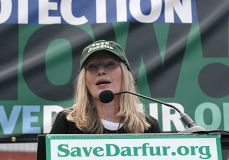Saving Darfur, multiple steps at a time
By Jeffrey H. Birnbaum
June 1, 2007 (WSHINGTON) — Lobbying groups regularly get their way in Washington, but few have had as much impact in a short period as the Save Darfur Coalition, an organization that has been pressing for international intervention in war-torn Sudan.
 Over the past two years, it has flooded lawmakers’ inboxes with pleas for assistance, filled the Mall with protesters and blanketed the airwaves with heart-rending commercials. One ad showed photos of anguished, starving Sudanese and asked, “How will history judge us?”
Over the past two years, it has flooded lawmakers’ inboxes with pleas for assistance, filled the Mall with protesters and blanketed the airwaves with heart-rending commercials. One ad showed photos of anguished, starving Sudanese and asked, “How will history judge us?”
These activities have been credited with keeping the issue in high profile and with spurring President Bush’s decision this week to impose economic sanctions on Sudan. “It’s done something that none of us thought would ever be possible — to start a mass movement on Sudan,” said Alex de Waal, a scholar on Africa.
Since 2003, as many as 450,000 people have been killed and about 2.5 million displaced by Arab militias with the backing of the Sudanese government.
None of the money collected by Save Darfur goes to help the victims and their families. Instead, the coalition pours its proceeds into advocacy efforts that are primarily designed to persuade governments to act.
Lately it has also pressured Fidelity Investments and Berkshire Hathaway to divest holdings in PetroChina, a large Chinese petroleum and natural gas company involved in Sudan’s oil industry.
Save Darfur was created in 2005 by two groups concerned about genocide in the African country — the American Jewish World Service and the U.S. Holocaust Memorial Museum. Today, the coalition is comprised of more than 180 groups, including the National Association of Evangelicals and the American Society for Muslim Advancement.
The coalition has a staff of 30 with expertise in policy and public relations. Its budget was about $15 million in the most recent fiscal year. Its funds come from individuals, Fortune 500 companies that match gifts from their employees and from foundations, such as the Oak Foundation and the Public Welfare Foundation.
In addition to its ads, the coalition provides updates about Darfur to 700,000 people across the country and routinely asks them to call or write to Bush and Congress.
Save Darfur will not say exactly how much it has spent on its ads, which this week have attempted to shame China, host of the 2008 Olympics, into easing its support for Sudan. But a coalition spokeswoman said the amount is in the millions of dollars.
Foreign policy experts in Congress credit the coalition with laying the groundwork for Bush’s new policy. “Save Darfur’s efforts to pressure the administration and Congress and keep the issue alive have had a tremendous impact,” said Sen. Joseph R. Biden Jr. (D-Del.), chairman of the Senate Foreign Relations Committee.
Bush administration spokesmen said the president’s sanctions decision was based on advisers’ first-hand knowledge of the region’s deteriorating situation. But they also acknowledged that groups such as Save Darfur were instrumental in making the issue a priority.
“These advocacy organizations play a good role in keeping American citizens informed of some issues that aren’t always on the nightly news,” said Gordon Johndroe, spokesman for the White House national security council. “The administration listens and speaks regularly to Save Darfur and other groups.”
Bush’s top diplomat dealing with Sudan praised the coalition’s ability to shine a light on the problem. “The Save Darfur Coalition has kept this issue in the news media and before the public and has focused the issue in a way that hasn’t happened in foreign relations maybe since the South Africa anti-apartheid movement,” said Andrew S. Natsios, Bush’s special envoy for Sudan.
The coalition does have some critics. De Waal, a program director at the Social Science Research Council, said the group should emphasize peace negotiations rather than intervention.
Save Darfur’s members do not agree. “We’ve been very effective in educating a large number of people and mobilizing a significant constituency concerned about the genocide that is willing to take targeted action to get our government to change their policy,” said Ruth W. Messinger, executive director of the American Jewish World Service.
In January 2006, the coalition launched the Million Voices for Darfur campaign to deliver 1 million hand-written and electronic postcards to Bush and Congress demanding that they take stronger measures to end violence. By June, the coalition held an event in the Capitol with then-Senate Majority Leader Bill Frist (R-Tenn.) and Sen. Hillary Rodham Clinton (D-N.Y.) who together signed the millionth postcard.
That spring, the coalition organized “Save Darfur: Rally to End Genocide” on the Mall that it says was attended by nearly 50,000 people. It was accompanied by more than 20 events around the country that together received extensive TV coverage, with more than 800 stories broadcast in the United States and Canada, according to the coalition.
In September, activists staged 57 events in 41 countries on six continents — from London to Kigali, Rwanda — which the coalition dubbed the Global Day for Darfur.
More events and advertising campaigns are planned. “There is no dancing in the end zone until the genocide has ended,” said M. Allyn Brooks-LaSure, a Save Darfur spokesman.
(Washington Post)
